Midweek Review
Against flawed assumptions and false analogies
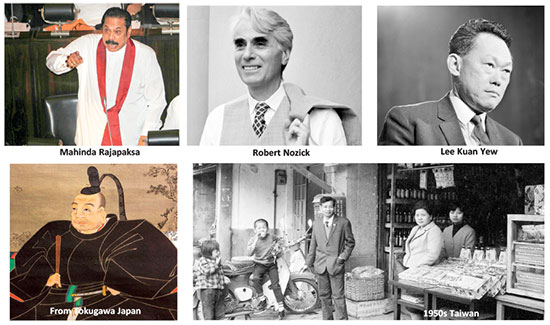
By Uditha Devapriya
“It is not enough to have a philosophy, you have to have the right philosophy.”
— Joan Robinson to the then Central Bank Deputy Governor, quoted by S. B. D. de Silva
Academics and students tend to subscribe to certain dominant ideological paradigms, the assumptions which underlie them, and the conclusions those assumptions lead them to. Given that universities, particularly local universities, have turned into knowledge factories preferring unconditional acceptance to critical thinking, false paradigms and analogies get perpetuated easily. They get embedded in school curricula, public forums, and of course the public sphere: as much in the lecture hall as in parliament.
Most of these paradigms delve into what the best way forward for the country should be, economically and politically, or what it should not be. For instance, the Vehicle Importers’ Association of Sri Lanka in a recent letter to the President cautions him against the belief that local manufacture and assembly is the answer to Sri Lanka’s mounting debt and foreign exchange crisis. The reason, whoever wrote that letter avers, is that the process “does not add any value to the country’s economy and is merely designed for tax evasion and higher profit margins.” Further, it warns that “setting up a vehicle manufacturing plant is a lengthy process with extensive planning and research and development.”
This is more or less a rehash of the line that advocates of free markets and free trade take up. The 2021 Budget, with its emphasis on import restrictions and concessions to local businesses, including manufacturers, compelled the same response from these advocates in Parliament. According to them, it favours import substitution over export orientation, cuts the country from the benefits of free trade, and isolates it from the rest of the world. The one leads to the other: if we manufacture locally, we lose out on trade. If we lose out on trade, we lose out on everything. Ergo, we mustn’t think or go local.
Intellectuals and commentators, especially in (but not necessarily limited to) the English language media, tend to extol the virtues of free markets and the evils of state-led growth. They seem to think that Sri Lanka for the most has been caving into the latter paradigm: the state has widened at the expense of the private sector. The solution, according to pundits and analysts, is to let the market decide, and to limit the government to the role of what Robert Nozick called a “Night-watchman”, formulating the rules of the game (the economy) without playing it (intervening in the workings of the economy). These pundits and analysts then point at societies that supposedly prospered under a night-watchman state: the Tiger economies of East Asia, the US, and Western Europe.
Now quite a lot of people believe this. They accept it as patently obvious: a tautology which, if denied, would lead to a contradiction. British philosophers of the 18th century made a distinction between two kinds of statements: “All thieves are criminals” and “Richard is a thief.” The first is self-evident: to deny it would be to defy logic. In other words it exists a priori: you know it’s true even if you don’t try to prove it. The second is not self-evident: you need empirical evidence to test its validity. Such statements of opinion require proof before one can know whether they are true or false. In the social sciences as in the hard sciences, then, critical analysis and logical reasoning are absolutely indispensable.
Unfortunately, much of the hype surrounding advocacy of free market principles and small government is built on a self-evident premise: people believe economic liberalisation will lead to growth, so they think it should be implemented in the country. Import tariffs must be reduced or preferably eliminated, export-orientation must replace import-substitution, let’s not think of local industrialisation or machine-manufacture yet because we’re an island, and let’s reduce the role of the state because, after all, in the US, Britain, and East Asia, it played a minimal role. Ignored in the emphasis on the success of the latter countries is the specificity of their historical experience.
Countries are not all endowed with the same levels or the same kinds of resources. Nor do they magically transit to free markets and small governments. To say economic liberalisation worked there and that owing to it these principles must be applied here is to assume that all it takes for a country to prosper is the implementation of policies to which those countries which are supposedly implementing them now resorted only after they had passed through certain stages. This assumption, quoting the late S. B. D. de Silva, is “a veritable non-sequitur of bourgeois scholarship.” Taking the earlier argument into consideration, such assumptions are paraded as tautologies when in fact they are not. What is missing from the argument, in other words, is the same thing its proponents accuse the other side, i.e. the Big Government protectionist lobby, of lacking: reasoned, analytical judgement.
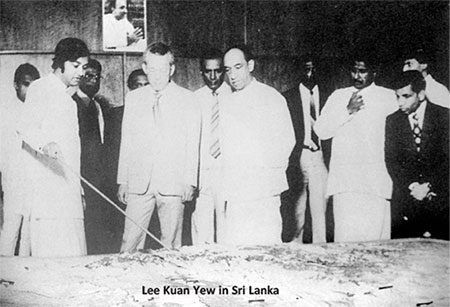 The US got to where it is largely through its leap to industrialisation in the latter part of the 19th century. Much of the industrialisation which transpired at that time was financed, not by private initiative, but by the government: vast tracts of land running into millions of acres were handed over to railway companies. In Britain, the state played an important role in promoting local industry, smothering the up-and-coming textile mills of India. Discussions about the success of private sector led growth in these countries leave out or ignore the role played by colonial conquest, which happened to be financed by the government. “Is there any greater example of a rampant state than the English state in the world?” asked a friend at an Advocata Night-Watchman seminar years ago. “When you’re talking laissez-faire, they were basically robbing the seas around the world, installing slavery.” True.
The US got to where it is largely through its leap to industrialisation in the latter part of the 19th century. Much of the industrialisation which transpired at that time was financed, not by private initiative, but by the government: vast tracts of land running into millions of acres were handed over to railway companies. In Britain, the state played an important role in promoting local industry, smothering the up-and-coming textile mills of India. Discussions about the success of private sector led growth in these countries leave out or ignore the role played by colonial conquest, which happened to be financed by the government. “Is there any greater example of a rampant state than the English state in the world?” asked a friend at an Advocata Night-Watchman seminar years ago. “When you’re talking laissez-faire, they were basically robbing the seas around the world, installing slavery.” True.
In East Asia three distinct case studies can be identified: Japan, Taiwan and South Korea, and Singapore. The foundation for Japan’s economy was laid down long before the war by the Tokugawa shogunate; it broke the stranglehold of petty traders, privileging industrial capital over merchant finance. Taiwan emerged from the war cut off from mainland China after the Communist takeover of 1949, yet American experts and economists who formulated that country’s transition to economic liberalisation didn’t embark on free market reforms right away: at first they oversaw rent reduction in 1949, the sale of public lands in 1951, and the commencement of a land-to-the-tiller program in 1953. Land reform limited ownership of paddy land to around 4.5 hectares, much lower than the 10-25 hectare limit imposed by the Sirimavo Bandaranaike government in 1972. South Korea underwent roughly the same set of reforms before it attained first world status.
Singapore is a different case, not least because unlike other East Asian countries it lacked a rural hinterland in which a transition from agriculture to industry could take place. Yet there too the role of government intervention cannot be denied, economically and also politically. Milton Friedman once referred to Lee Kuan Yew as a “benevolent dictator”, the very same epithet Maithripala Sirisena used on Mahinda Rajapaksa in 2014 after walking out from the then administration. In a 1993 essay, William Gibson described the country as “Disneyland with the Death Penalty”, bringing to mind Jagath Manuwarna’s remark about Sri Lanka at a press conference in late 2014: “kalakanni Disneylanthaya.” Unlike Manuwarna’s statement though, Gibson’s essay was banned by the Singaporean government.
Liberals and classical liberals, and even left-liberals, tend to look up to Singapore and Yew’s reforms without realising that, as Regi Siriwardena observed, their achievements rested on the denial of democratic and human rights. Hence when one columnist, drawing wildly false analogies, argues that Singapore lacked a president, yet accomplished much (implying that Sri Lanka doesn’t need an Executive Presidency to get things done), he fails to acknowledge or chooses to ignore not only that Singapore had just one political party during its transition from third world to first, but also that it curtailed dissent in a way that makes any hounding of dissent in Sri Lanka today look haphazard in comparison; when asked why he refused to tolerate political cartoons, for instance, Yew bluntly told Fergus Bordewich that in Confucian society politicians ought to be seen as deserving of respect. To my mind no parliamentarian in Sri Lanka has ever said the same thing using Buddhism as justification. I suppose that has to do with how free the media here is compared to the media there: the latest World Press Freedom Index, for instance, ranks Sri Lanka at 127, and Singapore at 158.
The absence of a rural hinterland made it all the easier for Singapore’s government to enact capitalist reforms, since it could dispense with the need to abolish the kind of pre-capitalist social relations that existed in Taiwan and South Korea. Despite this, however, government intervention swept across the country; in the words of one economist, Singapore responded to international economic forces “through manipulating the domestic economy.”
Wage adjustments vis-à-vis a National Wages Council, a high savings and investment culture promoted via state enforced and state directed abstinence, the shift towards manufacturing in the latter part of the 1960s, the growth of public enterprises (believed to have accounted for 14% to 16% of manufacturing output), and tight government control of trade unions all played a part in bolstering its prospects. As Hoff (1995) noted, the paradox of Singapore’s economic success was that while investments came from the private sector, savings relied on the public sector. It is true that the contribution by foreign investment was significant, yet had Singapore not had a rigidly regulated economy where, for instance, compensation costs for production workers were one-third that of the US equivalent by 1993, it would not have become the third world to first success story it is touted as today.
The specific conditions under which the East Asian economies transformed from developing to developed, from inward-looking to outward-looking, make their emulation in other parts of the world untenable if not unlikely. At the time the governments of these countries were imposing reforms, Western Europe was struggling to recover from wartime recession and MNCs had not become as active in peripheral countries as they would decades later. Their geopolitical alignment with the US in the Cold War guaranteed the success of the East Asian Tigers. Moreover, these were hardly what one could call classical liberal societies: political authoritarianism cohabited with economic liberalisation. Even that dichotomy comes off as false when we consider that government involvement figured heavily in these economies, something that advocates of free markets don’t seem to be aware of.
There was another significant factor: the absence of a merchant capitalist class in these countries. The Tokugawa reforms extended to Korea and Taiwan after Japan turned them into granaries for its domestic needs. The US experts hired to oversee reforms in Korea and Taiwan facilitated, rather than reversed, these processes. In Sri Lanka and much of the Third World, by contrast, experimentation with free market classical liberalism has resulted in not only political authoritarianism, but also the defenestration of an industrial sector, leading to lopsided growth financed by a Pettah merchant class: rather than manufacturing goods, they are imported and resold. The call for “going local”, then, contrary to what intellectuals, institutions, and Opposition MPs think, say, and write, has to do with more than a hysterical call for a garrison state. COVID-19 has sharpened the contradictions of the global economy. The World Bank and IMF paradigm of outward-oriented development is clearly not the way to go about, if we are to resolve these contradictions.
False analogies, assumptions, and tautologies thus will get us nowhere. It is certainly ironic that think-tanks and institutions that privilege reason over guesswork end up indulging in selective scholarship. Even more ironic are statements uttered by academics from countries which passed through several stages before making the transition from a planned order to a free market advising us to bypass those stages when implementing policy reforms here. It takes not only foresight and hindsight, but also courage, to swerve from and dispute these assumptions, dig deep into history, and understand what drives the wealth of nations and the poverty of others. Free markets alone will not do, as even the history of countries where they flourish today tell us. Something else can, and something else must.
- News Advertiesment
See Kapruka’s top selling online shopping categories such as Toys, Grocery, Flowers, Birthday Cakes, Fruits, Chocolates, Clothing and Electronics. Also see Kapruka’s unique online services such as Money Remittence,News, Courier/Delivery, Food Delivery and over 700 top brands. Also get products from Amazon & Ebay via Kapruka Gloabal Shop into Sri Lanka.
Midweek Review
‘Professor of English Language Teaching’
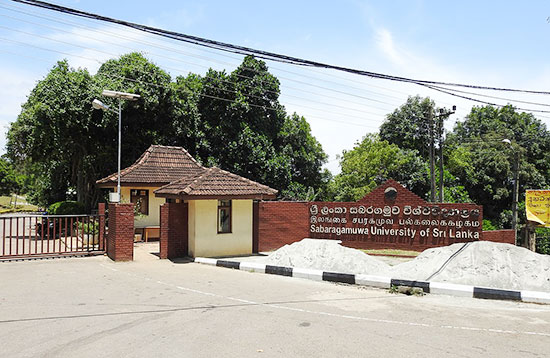
It is a pleasure to be here today, when the University resumes postgraduate work in English and Education which we first embarked on over 20 years ago. The presence of a Professor on English Language Teaching from Kelaniya makes clear that the concept has now been mainstreamed, which is a cause for great satisfaction.
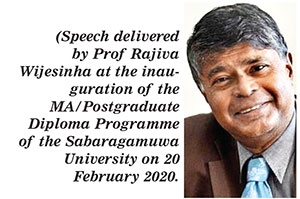 Twenty years ago, this was not the case. Our initiative was looked at askance, as indeed was the initiative which Prof. Arjuna Aluwihare engaged in as UGC Chairman to make degrees in English more widely available. Those were the days in which the three established Departments of English in the University system, at Peradeniya and Kelaniya and Colombo, were unbelievably conservative. Their contempt for his efforts made him turn to Sri Jayewardenepura, which did not even have a Department of English then and only offered it as one amongst three subjects for a General Degree.
Twenty years ago, this was not the case. Our initiative was looked at askance, as indeed was the initiative which Prof. Arjuna Aluwihare engaged in as UGC Chairman to make degrees in English more widely available. Those were the days in which the three established Departments of English in the University system, at Peradeniya and Kelaniya and Colombo, were unbelievably conservative. Their contempt for his efforts made him turn to Sri Jayewardenepura, which did not even have a Department of English then and only offered it as one amongst three subjects for a General Degree.
Ironically, the most dogmatic defence of this exclusivity came from Colombo, where the pioneer in English teaching had been Prof. Chitra Wickramasuriya, whose expertise was, in fact, in English teaching. But her successor, when I tried to suggest reforms, told me proudly that their graduates could go on to do postgraduate degrees at Cambridge. I suppose that, for generations brought up on idolization of E. F. C. Ludowyke, that was the acme of intellectual achievement.
I should note that the sort of idealization of Ludowyke, the then academic establishment engaged in was unfair to a very broadminded man. It was the Kelaniya establishment that claimed that he ‘maintained high standards, but was rarefied and Eurocentric and had an inhibiting effect on creative writing’. This was quite preposterous coming from someone who removed all Sri Lankan and other post-colonial writing from an Advanced Level English syllabus. That syllabus, I should mention, began with Jacobean poetry about the cherry-cheeked charms of Englishwomen. And such a characterization of Ludowyke totally ignored his roots in Sri Lanka, his work in drama which helped Sarachchandra so much, and his writing including ‘Those Long Afternoons’, which I am delighted that a former Sabaragamuwa student, C K Jayanetti, hopes to resurrect.
I have gone at some length into the situation in the nineties because I notice that your syllabus includes in the very first semester study of ‘Paradigms in Sri Lankan English Education’. This is an excellent idea, something which we did not have in our long-ago syllabus. But that was perhaps understandable since there was little to study then except a history of increasing exclusivity, and a betrayal of the excuse for getting the additional funding those English Departments received. They claimed to be developing teachers of English for the nation; complete nonsense, since those who were knowledgeable about cherries ripening in a face were not likely to move to rural areas in Sri Lanka to teach English. It was left to the products of Aluwihare’s initiative to undertake that task.
Another absurdity of that period, which seems so far away now, was resistance to training for teaching within the university system. When I restarted English medium education in the state system in Sri Lanka, in 2001, and realized what an uphill struggle it was to find competent teachers, I wrote to all the universities asking that they introduce modules in teacher training. I met condign refusal from all except, I should note with continuing gratitude, from the University of Sri Jayewardenepura, where Paru Nagasunderam introduced it for the external degree. When I started that degree, I had taken a leaf out of Kelaniya’s book and, in addition to English Literature and English Language, taught as two separate subjects given the language development needs of students, made the third subject Classics. But in time I realized that was not at all useful. Thankfully, that left a hole which ELT filled admirably at the turn of the century.
The title of your keynote speaker today, Professor of English Language Teaching, is clear evidence of how far we have come from those distant days, and how thankful we should be that a new generation of practical academics such as her and Dinali Fernando at Kelaniya, Chitra Jayatilleke and Madhubhashini Ratnayake at USJP and the lively lot at the Postgraduate Institute of English at the Open University are now making the running. I hope Sabaragamuwa under its current team will once again take its former place at the forefront of innovation.
To get back to your curriculum, I have been asked to teach for the paper on Advanced Reading and Writing in English. I worried about this at first since it is a very long time since I have taught, and I feel the old energy and enthusiasm are rapidly fading. But having seen the care with which the syllabus has been designed, I thought I should try to revive my flagging capabilities.
However, I have suggested that the university prescribe a textbook for this course since I think it is essential, if the rounded reading prescribed is to be done, that students should have ready access to a range of material. One of the reasons I began while at the British Council an intensive programme of publications was that students did not read round their texts. If a novel was prescribed, they read that novel and nothing more. If particular poems were prescribed, they read those poems and nothing more. This was especially damaging in the latter case since the more one read of any poet the more one understood what he was expressing.
Though given the short notice I could not prepare anything, I remembered a series of school textbooks I had been asked to prepare about 15 years ago by International Book House for what were termed international schools offering the local syllabus in the English medium. Obviously, the appalling textbooks produced by the Ministry of Education in those days for the rather primitive English syllabus were unsuitable for students with more advanced English. So, I put together more sophisticated readers which proved popular. I was heartened too by a very positive review of these by Dinali Fernando, now at Kelaniya, whose approach to students has always been both sympathetic and practical.
I hope then that, in addition to the texts from the book that I will discuss, students will read other texts in the book. In addition to poetry and fiction the book has texts on politics and history and law and international relations, about which one would hope postgraduate students would want some basic understanding.
Similarly, I do hope whoever teaches about Paradigms in English Education will prescribe a textbook so that students will understand more about what has been going on. Unfortunately, there has been little published about this but at least some students will I think benefit from my book on English and Education: In Search of Equity and Excellence? which Godage & Bros brought out in 2016. And then there was Lakmahal Justified: Taking English to the People, which came out in 2018, though that covers other topics too and only particular chapters will be relevant.
The former book is bulky but I believe it is entertaining as well. So, to conclude I will quote from it, to show what should not be done in Education and English. For instance, it is heartening that you are concerned with ‘social integration, co-existence and intercultural harmony’ and that you want to encourage ‘sensitivity towards different cultural and linguistic identities’. But for heaven’s sake do not do it as the NIE did several years ago in exaggerating differences. In those dark days, they produced textbooks which declared that ‘Muslims are better known as heavy eaters and have introduced many tasty dishes to the country. Watalappam and Buriani are some of these dishes. A distinguished feature of the Muslims is that they sit on the floor and eat food from a single plate to show their brotherhood. They eat string hoppers and hoppers for breakfast. They have rice and curry for lunch and dinner.’ The Sinhalese have ‘three hearty meals a day’ and ‘The ladies wear the saree with a difference and it is called the Kandyan saree’. Conversely, the Tamils ‘who live mainly in the northern and eastern provinces … speak the Tamil language with a heavy accent’ and ‘are a close-knit group with a heavy cultural background’’.
And for heaven’s sake do not train teachers by telling them that ‘Still the traditional ‘Transmission’ and the ‘Transaction’ roles are prevalent in the classroom. Due to the adverse standard of the school leavers, it has become necessary to develop the learning-teaching process. In the ‘Transmission’ role, the student is considered as someone who does not know anything and the teacher transmits knowledge to him or her. This inhibits the development of the student.
In the ‘Transaction’ role, the dialogue that the teacher starts with the students is the initial stage of this (whatever this might be). Thereafter, from the teacher to the class and from the class to the teacher, ideas flow and interaction between student-student too starts afterwards and turns into a dialogue. From known to unknown, simple to complex are initiated and for this to happen, the teacher starts questioning.’
And while avoiding such tedious jargon, please make sure their command of the language is better than to produce sentences such as these, or what was seen in an English text, again thankfully several years ago:
Read the story …
Hello! We are going to the zoo. “Do you like to join us” asked Sylvia. “Sorry, I can’t I’m going to the library now. Anyway, have a nice time” bye.
So Syliva went to the zoo with her parents. At the entrance her father bought tickets. First, they went to see the monkeys
She looked at a monkey. It made a funny face and started swinging Sylvia shouted: “He is swinging look now it is hanging from its tail its marvellous”
“Monkey usually do that’
I do hope your students will not hang from their tails as these monkeys do.
Midweek Review
Little known composers of classical super-hits
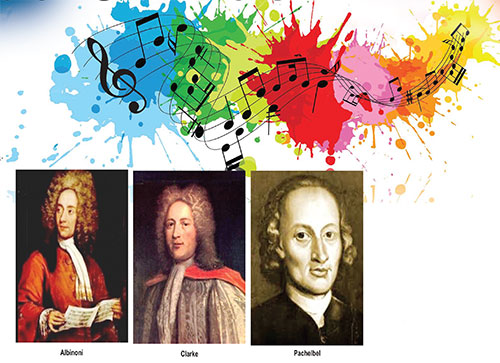
By Satyajith Andradi
Quite understandably, the world of classical music is dominated by the brand images of great composers. It is their compositions that we very often hear. Further, it is their life histories that we get to know. In fact, loads of information associated with great names starting with Beethoven, Bach and Mozart has become second nature to classical music aficionados. The classical music industry, comprising impresarios, music publishers, record companies, broadcasters, critics, and scholars, not to mention composers and performers, is largely responsible for this. However, it so happens that classical music lovers are from time to time pleasantly struck by the irresistible charm and beauty of classical pieces, the origins of which are little known, if not through and through obscure. Intriguingly, most of these musical gems happen to be classical super – hits. This article attempts to present some of these famous pieces and their little-known composers.
Pachelbel’s Canon in D
The highly popular piece known as Pachelbel’s Canon in D constitutes the first part of Johann Pachelbel’s ‘Canon and Gigue in D major for three violins and basso continuo’. The second part of the work, namely the gigue, is rarely performed. Pachelbel was a German organist and composer. He was born in Nuremburg in 1653, and was held in high esteem during his life time. He held many important musical posts including that of organist of the famed St Stephen’s Cathedral in Vienna. He was the teacher of Bach’s elder brother Johann Christoph. Bach held Pachelbel in high regard, and used his compositions as models during his formative years as a composer. Pachelbel died in Nuremburg in 1706.
Pachelbel’s Canon in D is an intricate piece of contrapuntal music. The melodic phrases played by one voice are strictly imitated by the other voices. Whilst the basso continuo constitutes a basso ostinato, the other three voices subject the original tune to tasteful variation. Although the canon was written for three violins and continuo, its immense popularity has resulted in the adoption of the piece to numerous other combinations of instruments. The music is intensely soothing and uplifting. Understandingly, it is widely played at joyous functions such as weddings.
Jeremiah Clarke’s Trumpet Voluntary
The hugely popular piece known as ‘Jeremiah Clarke’s Trumpet Voluntary’ appeared originally as ‘ The Prince of Denmark’s March’ in Jeremiah Clarke’s book ‘ Choice lessons for the Harpsichord and Spinet’, which was published in 1700 ( Michael Kennedy; Oxford Dictionary of Music ). Sometimes, it has also been erroneously attributed to England’s greatest composer Henry Purcell (1659 – 1695 ) and called ‘Purcell’s Trumpet Voluntary (Percy A. Scholes ; Oxford Companion to Music). This brilliant composition is often played at joyous occasions such as weddings and graduation ceremonies. Needless to say, it is a piece of processional music, par excellence. As its name suggests, it is probably best suited for solo trumpet and organ. However, it is often played for different combinations of instruments, with or without solo trumpet. It was composed by the English composer and organist Jeremiah Clarke.
Jeremiah Clarke was born in London in 1670. He was, like his elder contemporary Pachelbel, a musician of great repute during his time, and held important musical posts. He was the organist of London’s St. Paul’s Cathedral and the composer of the Theatre Royal. He died in London in 1707 due to self – inflicted gun – shot injuries, supposedly resulting from a failed love affair.
Albinoni’s Adagio
The full title of the hugely famous piece known as ‘Albinoni’s Adagio’ is ‘Adagio for organ and strings in G minor’. However, due to its enormous popularity, the piece has been arranged for numerous combinations of instruments. It is also rendered as an organ solo. The composition, which epitomizes pathos, is structured as a chaconne with a brooding bass, which reminds of the inevitability and ever presence of death. Nonetheless, there is no trace of despondency in this ethereal music. On the contrary, its intense euphony transcends the feeling of death and calms the soul. The composition has been attributed to the Italian composer Tomaso Albinoni (1671 – 1750), who was a contemporary of Bach and Handel. However, the authorship of the work is shrouded in mystery. Michael Kennedy notes: “The popular Adagio for organ and strings in G minor owes very little to Albinoni, having been constructed from a MS fragment by the twentieth century Italian musicologist Remo Giazotto, whose copyright it is” (Michael Kennedy; Oxford Dictionary of Music).
Boccherini’s Minuet
The classical super-hit known as ‘Boccherini’s Minuet’ is quite different from ‘Albinoni’s Adagio’. It is a short piece of absolutely delightful music. It was composed by the Italian cellist and composer Luigi Boccherini. It belongs to his string quintet in E major, Op. 13, No. 5. However, due to its immense popularity, the minuet is performed on different combinations of instruments.
Boccherini was born in Lucca in 1743. He was a contemporary of Haydn and Mozart, and an elder contemporary of Beethoven. He was a prolific composer. His music shows considerable affinity to that of Haydn. He lived in Madrid for a considerable part of his life, and was attached to the royal court of Spain as a chamber composer. Boccherini died in poverty in Madrid in 1805.
Like numerous other souls, I have found immense joy by listening to popular classical pieces like Pachelbel’s Canon in D, Jeremiah Clarke’s Trumpet Voluntary, Albinoni’s Adagio and Boccherini’s Minuet. They have often helped me to unwind and get over the stresses of daily life. Intriguingly, such music has also made me wonder how our world would have been if the likes of Bach, Handel, Haydn, Mozart, Beethoven, and Schubert had never lived. Surely, the world would have been immeasurably poorer without them. However, in all probability, we would have still had Pachelbel’s Canon in D, Jeremiah Clarke’s Trumpet Voluntary, Albinoni’s Adagio, and Boccherini’s Minuet, to cheer us up and uplift our spirits.
Midweek Review
The Tax Payer and the Tough
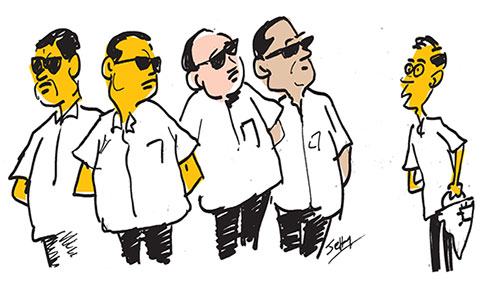
By Lynn Ockersz
The tax owed by him to Caesar,
Leaves our retiree aghast…
How is he to foot this bill,
With the few rupees,
He has scraped together over the months,
In a shrinking savings account,
While the fires in his crumbling hearth,
Come to a sputtering halt?
But in the suave villa next door,
Stands a hulk in shiny black and white,
Over a Member of the August House,
Keeping an eagle eye,
Lest the Rep of great renown,
Be besieged by petitioners,
Crying out for respite,
From worries in a hand-to-mouth life,
But this thought our retiree horrifies:
Aren’t his hard-earned rupees,
Merely fattening Caesar and his cohorts?









